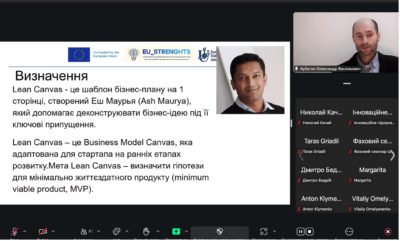Today, the course “Innovative Entrepreneurship and Startups in the EU” has successfully launched, introducing participants to European practices of startup development and innovative entrepreneurship. The course highlights opportunities for Ukrainian businesses in the EU and fosters a community that brings together representatives of business, the public sector, academia, and other interested stakeholders. Over 80 participants joined the first online sessions.
Together with Oleksandr Kubatko – Doctor of Economics, Professor, Associate Professor at the Department of Economics, Entrepreneurship, and Business Administration at Sumy State University, and an expert of the regional GCIP accelerator under the UNIDO/GEF project – participants explored:
🔍 the architecture of entrepreneurial and startup ecosystems;
🔍 the stages of startup development;
🔍 opportunities for Ukrainian businesses in the EU market and current trade trends with the European Union.
📌 Practical cases discussed:
• Real success stories of Ukrainian startups on the global market.
• Specifics of the European startup ecosystem development.
• Recommendations on promising market niches for Ukrainian SMEs in Europe.
Participants have access to educational materials and session recordings via the Canvas platform, providing a convenient learning format.
🔜 What’s next?
Upcoming sessions will cover:
• grant opportunities for businesses;
• starting a business in the EU;
• taxation aspects and much more.
We sincerely thank the trainers and participants for their active engagement and interest! 🌟
The course “Innovative Entrepreneurship and Startups in the EU” is implemented within the framework of the Jean Monnet Chair project “Strengthening EU Leadership and Capacity in Science and Innovation” (101175767—EU_STRENGHTS—ERASMUS-JMO-2024-HEI-TCH-RSCH) 2024–2027.
Funded by the European Union. Views and opinions expressed are however those of the author(s) only and do not necessarily reflect those of the European Union or the European Education and Culture Executive Agency (EACEA). Neither the European Union nor EACEA can be held responsible for them

